 YOG kicks off in Nanjing
YOG kicks off in Nanjing
 Colorful life at Youth Olympic Village of Nanjing 2014 YOG
Colorful life at Youth Olympic Village of Nanjing 2014 YOG
 Royal Taoist temple to open to public
Royal Taoist temple to open to public
 Female soldiers at quake-hit area
Female soldiers at quake-hit area
 Shocking photos of cruel battles in Ukraine
Shocking photos of cruel battles in Ukraine
 Amphibious armored vehicle unit conducts open sea drill
Amphibious armored vehicle unit conducts open sea drill
 Water relay in Henan
Water relay in Henan
 Ethnic culture feasts eyes of travelers
Ethnic culture feasts eyes of travelers
 80 security dogs assembled in Nanjing police dog training base
80 security dogs assembled in Nanjing police dog training base
 Graffiti artists paint on street walls in Xinjiang
Graffiti artists paint on street walls in Xinjiang
BEIJING, Aug. 21 -- The Chinese Academy of Sciences (CAS), China's top science think tank, plans to put itself in the vanguard of the reform of scientific research, said Bai Chunli, CAS president, Thursday.
The CAS rolled out a complete restructuring program for more than 100 subordinate institutes on Tuesday, sorting them into four functional categories - applied technology for industry; academic research; engineering; and basic research that requires long-term investment.
The changes are not simply a reshuffling of institutes, but an attempt to manage each differently. Different functions require different setups, rules, assessment standards and fundraising, Bai said in an interview with Xinhua.
The goal is efficient management of scientists and research because, compared with the world's leading research institutes, the CAS has a number of weaknesses.
"We have tried to make changes before, but none of them really got to the heart of the matter," Bai said. "Research areas of some of our institutes overlap and a number of projects repeat one another unnecessarily. The quality of research is not satisfactory."
The CAS has a staff of more than 50,000, 12 sub-academies, more than 100 institutes directly attached to it, about 100 state labs and 212 field stations.
Wan Gang, minister of science and technology, told Xinhua that, compared with developed countries, China's science sector is poorly managed and inefficient, with less information sharing and communication; problems that have held back scientific development despite increased investment.
The government hopes more commercial enterprises will work with research institutes, but for that to happen, institutes need to be more open and flexible, Wan said. At least 25 companies listed on China's A-share market are controlled by universities and research institutes with a total market value of about 187.8 billion yuan (30.49 billion US dollars)
On Monday, a report on innovation was discussed at a meeting of the Central Leading Group on Financial and Economic Affairs, headed by President Xi Jinping and attended by Premier Li Keqiang.
Xi asked for concrete policy on innovation-driven development; national science and technology programs; and breakthroughs in projects that demonstrate the nation's strategic intent.
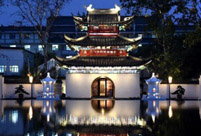 Beautiful night scenery of Nanjing
Beautiful night scenery of Nanjing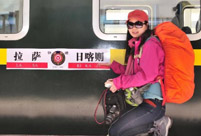 Passenger transport starts on Tibet's new railway
Passenger transport starts on Tibet's new railway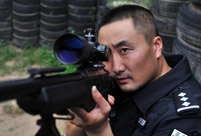 Story of outstanding Beijing swat sniper
Story of outstanding Beijing swat sniper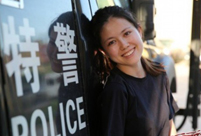 Beautiful policewoman in an anti-terrorism SWAT team
Beautiful policewoman in an anti-terrorism SWAT team Cute photos of little Taoist nuns and monks go viral online
Cute photos of little Taoist nuns and monks go viral online Amphibious armored vehicle unit conducts open sea drill
Amphibious armored vehicle unit conducts open sea drill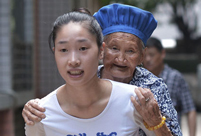 A post-90s girl who takes grandma to work
A post-90s girl who takes grandma to work Beijing policewomen posters become a hit
Beijing policewomen posters become a hit Photo story: How a baby panda grows up
Photo story: How a baby panda grows up Star-leveled nursing home in a small county
Star-leveled nursing home in a small county Evidence of monstrous crime of Japanese invaders
Evidence of monstrous crime of Japanese invaders Foreign models compete with Chinese in Cheongsam show
Foreign models compete with Chinese in Cheongsam show The beautiful pictures of ancient Chinese architecture
The beautiful pictures of ancient Chinese architecture The Muslims involved in relief work
The Muslims involved in relief workDay|Week|Month